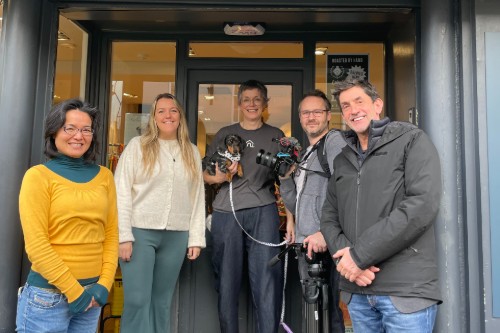
(Left to right) BBC News Climate Editor Justin Rowlatt interviewing Professor Guy Poppy, Pro Vice-Chancellor for Research and Innovation, about the prospect of cultured meat with dachshund Maude (centre) who approved of the treats in the taster session.

BBC News Climate Editor Justin Rowlatt tests out the new dog treats, which incorporate cultured meat, with hungry customers.

The BBC News team with staff at Doghouse pet store in Clifton, Bristol.
Dogs in Bristol were amongst the first in the country to woof down snacks made from lab-grown meat in a bid to advance the future of alternative protein sources and help cut carbon emissions.
The taster session was hosted by Doghouse pet store in Clifton, where a group of hungry pooches sampled products from Meatly – the first company in the UK and Europe authorised to sell cultivated meat.
Hot on the tail of the scoop, BBC News Climate Editor Justin Rowlatt interviewed Professor Guy Poppy, Pro Vice-Chancellor for Research and Innovation at the University of Bristol, who is a top expert on food and how to transform food systems for healthier people and a healthier planet.
There is of course a serious purpose to these novel canine snacks, which go on sale today, as challenges in achieving more sustainable diets apply to both pets and humans.
Animal agriculture is estimated to produce up to a fifth of greenhouse gas emissions as well as posing environmental pressures on the use of water and land. As the global population rises, demand for protein is also rapidly growing with some sources, including the United Nations Environment Programme, indicating meat consumption alone could grow by up to 50% by 2050.
Scientists say such pressures could be reduced by eating 'more green' foods, such as lab-grown meat and ground-up insects, as opposed to the typically meat and dairy-heavy European diet.
Prof Poppy, who is also Director of Transforming UK Food Systems – a £50 million UK Research and Innovation-funded programme, said: "The Food we currently eat and how we produce it is putting our planet and health in peril. Population growth and worsening climate change mean supplementing livestock agriculture with alternative protein sources is imperative to meet demands for a more sustainable and healthy diet.
"Ambitious plans are underway to help make the UK a global leader in the development of next generation alternative protein products, services, and technologies. Bristol is playing an exciting part in different ways, including conducting innovative research and introducing 'greener', tastier menu options for students."
Last year UKRI launched the National Alternative Protein Innovation Centre, of which Prof Poppy is chairman of the Board, to drive forward research and innovation into cultured meat, insect-based proteins, and proteins made by fermentation.
The Transforming the UK food system programme has been running since 2020 and is advising Government Departments, Industry and consumer groups on how to transform the UK food system for healthier people and a healthier planet. The University of Bristol is amongst more than 40 academic institutions and some 400 private, public and third sector organisations involved in the initiative, which also includes business, farmers, regulators and councils.
Reaching net zero and tackling climate change is a key research priority at the University, which was the first in the UK to declare a climate emergency.
Experts have carried out research into how consumers respond to alternatives to conventional meat products, including cultured – also referred to as slaughter-free – meat. Taste, how filling it is, healthiness, cost, and level of disgust were rated.
Dr Dani Ferriday, Associate Professor in Nutrition and Behaviour, said: "We found meat eaters found the cultured burger less appealing in all aspects, except disgust which was higher. But non-meat eaters held both products in similar regard, having lower disgust with the cultured burger. The results suggest consumers following a vegetarian or vegan diet may be more receptive to alternative protein sources, including cell-cultivated products."
A study has also demonstrated how adding eco-friendly ratings on menu items significantly increases the likelihood of diners choosing more sustainable options.
To help students make more informed decisions, all catered halls at the University now show the carbon footprint of every meal served.
Alex Sim, Development Chef, said: "Students tend to prefer naturally plant-based dishes – things like margherita pizza, mac 'n' cheese, or falafel wraps – over highly processed meat alternatives, which are viewed with increasing suspicion. While there's curiosity about plant-based burgers, sausages etc., traditional comfort foods that happen to be vegetarian or vegan-friendly are far more accepted.
"The challenge is balancing sustainability with what students genuinely want to eat, and we're always looking for ways to make low-carbon choices the easy and exciting option."
Alex is collaborating with Jeff Brunstrom, Professor of Experimental Psychology, and chefs across the country to design dishes which maximise taste and minimise carbon emissions. So far these recipes have focused on combining grains, legumes and vegetables in a multi-sensory experience.
Whether students would be equally receptive to slaughter-free meat options has yet to be tested, but Prof Brunstrom is optimistic with good reason.
He said: "Take pizza – people love it, but food technologists have learned it's difficult to make it any healthier or more sustainable because people just don't like their pizza with less cheese. Recognising this is a major barrier, we figured rather than trying to make familiar dishes more sustainable, why not create entirely different ones?
"So, we gave a team of chefs some especially healthy and sustainable ingredients and challenged them to invent something completely fresh. The results were amazing because in every case, consumers found our novel dishes even more delicious and popular than traditional favourites like lasagne.
"The added advantage of this approach is it would be easy to incorporate unconventional ingredients, like cultured meat and other alternative protein sources if and when they become more available. We have exciting plans to scale our novel recipes up, creating bigger, more wide-reaching changes to the foods eaten in the UK."
Besides changing attitudes and behaviours, cost, government policy and regulatory approval are also significant factors.
Prof Poppy, former Chief Scientific Adviser to the Food Standards Agency (FSA) and UKRI Food Sector Champion, added: "Scaling up production to make the product more affordable is a challenge. The UK is well-placed to introduce policy change supporting such developments and has a world leading scientific capability creating the innovation needed for transformation.
"But, first and foremost, the public can also be reassured no product will be available without having met the most rigorous standards, including clear scientific evidence it is safe to eat. This means the implications for human health as well as the environment are positive, providing real food for thought about a more sustainable future."






